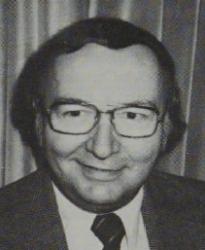Planning worship?
Check out our sister site, ZeteoSearch.org,
for 20+ additional resources related to your search.
- |
User Links
Person Results
Ellis J. Crum

1928 - 2011 Person Name: E. J. C. Author (stanzas 2-5) of "Rolled Away" in Special Sacred Selections
Ellis J. Crum
Robert Harkness

1880 - 1961 Person Name: R. H. Author of "Rolled Away" in Alexander's Gospel Songs No. 2 After attending a revival meeting by Reuben Torrey and Charles M. Alexander, Harkness became Alexander’s pianist. He came to Christ shortly thereafter (on a bicycle, he said), and made several round the world tours with Torrey and Alexander.
Harkness was especially well known for his program The Music of the Cross, and as the author of correspondence courses in hymn playing. He wrote over 2,000 hymns and Gospel songs in his lifetime.
(hymntime.com/tch)
Robert Harkness
Herbert G. Tovey
1888 - 1972 Harmonizer of "[Rolled away, rolled away, rolled away]" in Youth Sings
Herbert G. Tovey
Walter Dustin Kallenbach
1905 - 1946 Person Name: W. D. K. Author of "Rolled Away" in Revival Hymns and Choruses
Walter Dustin Kallenbach
R. R. Brown
Arranger of "[Rolled away, rolled away, rolled away]" in Salvation Songs for Children, Number 3
R. R. Brown
J. R. Baxter

1887 - 1960 Author of "Rolled away" Jesse Randall (Pap) Baxter, Jr. (1887-1960)
Born: December 8, 1887, Lebanon, Alabama.
Died: January 21, 1960.
Baxter grew up in DeKalb County, Alabama. In 1926, he bought part of Virgil Stamps’ Gospel music firm, which became the Stamps-Baxter Music and Printing Company, one of the most successful Gospel music publishers of the early 20th Century. Baxter ran the company’s Chattanooga, Tennessee, office until Stamps’ death in 1940, then moved to Dallas, Texas, to run the main office. After Baxter’s death, his wife, Clarice, ran the business until she died; it was then sold to Zondervan. Baxter was inducted into the Southern Gospel Music Association Hall of Fame in 1997.
Lyrics--
After the Sunrise
Farther Along
God Shall Wipe Away All Tears (© 1940)
He Bore It All
I Have Peace in My Soul
I Hold His Hand (© 1929)
I Love My Savior, Too
I Want to Help Some Weary Pilgrim
I’m Living in Canaan Now
Living Grace
Praise the Lamb of God
Something Happens
Travel the Sunlit Way
Try Jesus
When He Blessed My Soul
When We Meet to Part No More
© Cyber Hymnal™ (www.hymntime.com/tch)
J. R. Baxter
George Cooper
1840 - 1927 Author of "Angels Rolled the Stone Away" George Cooper, poet, was born in the city of New York, May 14, 1840 son of John and Hepzibah Cooper, He was educated in the public schools of his native city, and afterwards studied law under the late Chester A. Arthur. After practicing for a short time, he renounced his profession to devote himself to the vocation to which his natural gifts inclined him. In his early years, he had developed a taste for writing, and before his sixteenth year had begun to contribute acceptable verses to several leading magazines. Encouraged by the success that met his early productions, he wrote constantly, and became a regular contributor to such periodicals as “The Independent,” “Harpers’ Young People,” and “Harper’s Magazine,” “Atlantic Monthly,” “Putman’s Monthly,” “Our Young Folks,” and “Appleton’s Journal.” Writing constantly for more than a decade, Mr. Cooper has frequently enriched the periodical literature of America by verses of much felicity, and has attracted a wide circle, among his poems are always welcomed with pleasure. His happiest verse has been written for children, and in it lies his chief claim to remembrance. A number of his children’s poems have been published in the collection known as “School and Home Melodies;” and he also issued a volume of hymns consisting exclusively of his own writing and entitled, “The Chaplet.” Among his best-known songs are: “Beautiful Isle of the Sea,” “Must We Then Meet as Strangers,” “Sweet Genevieve,” “While the days Are Going By,” and “God Bless the Little Church Around the Corner.” He has written song words for such composers as Wallace, Abt, Thomas, Millard, and Foster. Of His Other poems, “After,” and “Hereafter” are general favorites; the “Ballad of the Storming of Stony Point” was awarded a prize, and “Learning to Walk” was honored by a commendation from the late William Cullen Bryant. Mr. Cooper was married, in 1877, to Mary E., Daughter of William Tyson, and has since resided at Jersey Heights, where he still employs his leisure in writing.
--http://www.mamalisa.com/blog/only-one-mother-–-a-poem
George Cooper
James Rowe

1865 - 1933 Author of "When the King Divine Saved Me" in Songs of Perennial Glory Pseudonym: James S. Apple.
James Rowe was born in England in 1865. He served four years in the Government Survey Office, Dublin Ireland as a young man. He came to America in 1890 where he worked for ten years for the New York Central & Hudson R.R. Co., then served for twelve years as superintendent of the Mohawk and Hudson River Humane Society. He began writing songs and hymns about 1896 and was a prolific writer of gospel verse with more than 9,000 published hymns, poems, recitations, and other works.
Dianne Shapiro, from "The Singers and Their Songs: sketches of living gospel hymn writers" by Charles Hutchinson Gabriel (Chicago: The Rodeheaver Company, 1916)
James Rowe
J. M. Henson

1887 - 1972 Composer of "[What a burden rolled away on that precious, happy day]" in Songs of Perennial Glory
J. M. Henson
Carl Maria von Weber

1786 - 1826 Person Name: C. M. von Weber, 1786-1826 Composer of "WILMOT" in Book of Hymns and Tunes, comprising the psalms and hymns for the worship of God, approved by the general assembly of 1866, arranged with appropriate tunes... by authority of the assembly of 1873 Carl Maria von Weber; b. 1786, Oldenburg; d. 1826, London
Evangelical Lutheran Hymnal, 1908
Carl Maria von Weber


 My Starred Hymns
My Starred Hymns


